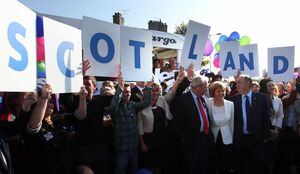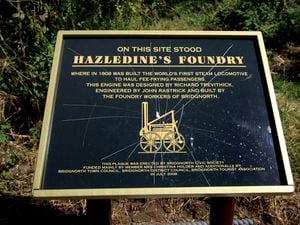Let's stay together, Scottish-born West Midlands MP pleads ahead of referendum
'I was born, brought up and educated in Scotland but have spent all my working life in England,' writes Wolverhampton South East MP Pat McFadden.

'England is my home and the birthplace of my own children.'
My story is not an uncommon one in this shared island.
The countries that make up the United Kingdom have strong ties and have been through so much together yet Scotland stands on the brink of a decision which could break up the 300-year-old union.
A few days ago In Glasgow I watched the Yes and No sides face off against each other with some hostility, though thankfully no violence, at the foot of the statue of Donald Dewar, the Scottish politician who was the driving force behind devolution but who deeply opposed nationalism and separatism.
That scene at the statue, and all the opinion polls in this debate, show a country deeply divided between Yes and No. It has seemed at times like an argument between head and heart, with the Yes side having the passion and the No side the facts. Yet that is too glib because there is passion on both sides of this fiercely contested argument.
The Yes side argues it is running the positive campaign - a bit easier when you are campaigning for the word yes - but underneath it is a deeply negative belief: that Scotland's problem is its ties to the UK.
The nationalists present a blank canvass onto which everyone is invited to paint their picture of what paradise might be like. Scandinavian levels of welfare with American levels of taxes.
Objections against this are dismissed as bluff and negative, yet from currency to defence to jobs, the objections are real and substantive.
All three main UK parties have said, quite understandably, that there will be no currency union with an independent Scotland. Such a union would require shared monetary policy, the Bank of England continuing to stand behind Scottish banks, and agreements on tax and spending. Little wonder that the Governor of the Bank of England said it didn't sound much like sovereignty.
Scotland could still use the pound, as Panama uses the dollar, but would have to build up large reserves to do so, entailing painful tax and spending decisions way beyond what the country is going through now. It would do so without the kind of financial firepower that helped Britain through the financial crisis - hence the announcements by virtually the whole Scottish banking industry that they would move their headquarters operations to England in the event of separation.
In defence Scotland is currently protected by the best armed forces in the world, to which it makes a huge contribution. But who really believes Scottish armed forces on their own would be comparable?
And when it comes to jobs many companies operate seamlessly on both sides of the border helping to create jobs and benefit from a UK and European wide market.
But in the end it is not just about risks and objections. Perhaps the missing factor in this campaign has been a discussion of the special place of the UK in the world. For me it has never been a case of 'can't' when it comes to Scottish independence. There are, after all, many countries of five million people in the world. It is a question of the best future for Scotland and for Britain.
The UK is the most successful multi national union in history. A country which stood against and defeated fascism in World War II, at times alone, founded and developed the best most socially just system of health care in the world, which has enormous creativity and cultural reach around the world despite having just 1% of global population, which acts as an influential bridge between the US and Europe and which had the strength to withstand a very difficult financial crisis which crushed smaller countries is a country worth being part of. Head and heart should not be on opposite sides. Being part of the UK is worth standing up for.
Scotland's contribution to the UK is immense. It can continue to be in the future. We live in an interdependent world. The challenges of globalisation can be tough and have prompted debate in England too. But globalisation presents great opportunities as well as challenges and Britain is well placed to take advantage of them. That's where the best opportunity lies for young people in Scotland and England alike - not a splintering retreat into a shrunken view of our place in the world.







